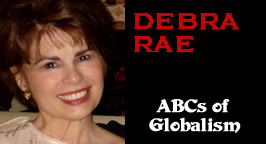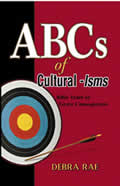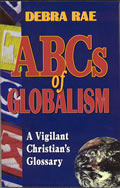APOCALYPTIC
ANGST
PART 2
By
Debra Rae
August 1, 2010
NewsWithViews.com
Part 2. So … Who’s Right?
Apocalyptic angst drives many religionists to speculate about earth’s perilous last days and her inhabitants’ final judgment. Monotheistic faiths temper news of pending calamity with promise of paradise (janah for Muslims), a heavenly abode (gan’eden for Jews), or a new heaven and new earth (the New Jerusalem for Christians).
In assessing the worth of any belief, especially “happily ever after” scenarios as these, one principle prevails: Let God be true and every opposing man (or spirit) a liar.[1] Of course, this begs the questions: Just what is truth, and who’s to say something is (or isn’t) true? Aren’t all religions and end-time beliefs equally valid? All’s well that ends well, right?
No, not necessarily. Were it not for the gravity of very real consequences it might be okay to “live and let live.” However, if last days are marked by economic and political upheavals, a series of armed conflicts, breakdown of the earth’s ecosystem, unprecedented corruption, deception, persecution, and divine judgment, then to alert and rightly instruct the unwary is more than appropriate; it’s a moral mandate.
Clearly, the God of the Bible invites us to come that we might reason together with Him.[2] In doing so, an honest person examines reality, employs logic, draws from the knowledge base he’s acquired, judges the fruit of his life, and attends to the all-important test of time.
For their willing, diligent Bible study to verify truth, Bereans were dubbed nobler than counterparts who apparently failed to do likewise.[3] Anointed revelation and Berean due diligence guide the faithful to knowledge of truth. Certainly not everyone will be convinced; but an honest, levelheaded discussion is warranted.
Reality
Reality is not a matter of personal opinion, nor does it adjust to accommodate falsity. Insist that “thumbs down” points south and “thumbs up” points north, but this can’t alter the fact that, when freely suspended, a magnet always points toward the north- and south- poles. Faith governed by superstition, feelings, mindless traditions, fear, force, will power, or blind commitment is fundamentally irrational and destined to succumb to reality.[4]
Certainly, New Age guru Eckhart Tolle may insist that knowledge is illusory, but then the science of gravity is no figment of the imagination. Try leaping out of a plane without a parachute. Sooner, if not later, reality wins out; that’s knowledge you can count on.[5] In contrast, believe as you may, crossing your fingers or rubbing a rabbit foot will not guarantee winning a jackpot lottery.
If knowledge were illusion, as Tolle contends, then why distinguish between being “conscious” and “unconscious”? Doing so presupposes discernment based on knowledge. Even more, Tolle believes that the “we-they” construct—i.e., saved, unsaved—blemishes Christianity, but evades New-Earth consciousness. In nurturing what he calls the “I’m right; you’re wrong fallacy,” Christians allegedly exercise an “illusory sense of superiority.” Never mind that, by declaring himself “awakened,” Tolle distinguishes his own enlightened knowledge from the “unconscious collective human ego.” Sounds to me like “I’m right; you’re wrong.”
When open to a-biblical points of view, the double-minded person alleging Christ-consciousness may indeed “win friends and influence people,” but he has a reality problem nonetheless.[6] (Can you say narcissistic personality disorder?)
After all, cosmic humanists who awaken to their own Christhood are self-proclaimed gods; but then erroneous knowledge at the worldview level is, at best, destabilizing.[7] Demi-gods don’t always see eye-to-eye. Remember Greek mythology: Cronus overthrew his father and, in turn, was overthrown by his own sons, Zeus, Hades, and Poseidon. And so it goes.
Logic
Plainly, it’s irrational to presume that all religious traditions are one-and-the-same when, in fact, they teach and practice radically different things. An apt, logic-defying analogy is taking the freeway exit to the north in search of a southbound destiny. It’s not a good idea.
By way of further example, Bible principles guided by simple logic preclude a would-be martyr’s strapping on a bomb to ensure sensual pleasures in the afterlife. Once again, it’s not a good idea.
Knowledge
Consider this: There is no reason in the nature of things why the God of the Bible could not or should not exist. Why? Because there is nothing about the realm of nature that renders this God improbable or implausible.[8] On the other hand, Eastern mysticism thrives on implausibility.
Eckhart Tolle may well believe that sin, evil, and the devil are illusory. But, then, a proclaimed truism isn’t necessarily so simply because someone wants it to be true—or because its acceptance is somehow fashionable or profitable.
That said, good and evil can be known.[9] However, such knowledge increases sorrow.[10] Case in point: Although many exploit human vulnerability for self-gain, all people of honor recognize the evil of human trafficking. Today, an estimated 158 million children are forced into slave labor. For good reason, the Bible instructs us to add knowledge to virtue.[11] Rightly so, former U.S. Secretary of State Condoleeza Rice characterizes defeat of human trafficking as “a great moral calling of our time.”
By His very nature, the God of the Bible is a God of knowledge, which He imparts freely.[12] Not just “cunningly devised fables,” but experiential knowledge testifies to this truth.[13] Remarkably, there are 800 Old Testament and 4,800 New Testament manuscripts indisputably substantiating the life, death, and resurrection of Christ. Though faith transcends the here-and-now, it’s well supported by knowledge. Rightly viewed, faith is “substance” and “evidence.”[14]
Unfortunately, worldly knowledge breeds arrogance;[15] nevertheless, knowing truth not only is attainable, but also it’s liberating.[16] Just what constitutes Christian knowledge? A Christian knows that his Redeemer lives.[17] He’s assured that Christ is his Savior always working for good.[18] Even beyond this life, a Christian remains God’s enduring workmanship.[19] The LORD will safeguard His own until united “face to face.”[20] Because of the measurable God-given love a Christian has for his fellows, he has evidence for having passed from death to life.[21]
Fruit
One’s worldview determines the orientation of everything else he thinks and does. When lived out, a worldview bears fruit that is bitter or sweet, abundant or scarce. Even Eastern mystics revere Jesus and acknowledge the enduring fruit of His life and ministry. In contrast, when examined in the light of world history and contemporary geo-politics, roots of ancient wisdom, as expounded by Eckhart Tolle, yield something altogether different. Visit India or Tibet to see for yourself.
Test of Time
No faith can be a man’s real religion if he knows that it is true only for certain places and certain people. Moreover, belief as mere personal opinion is unstable.[22] Whimsy will not stand the test of time, nor will man-fashioned, albeit longstanding world religions stand the test of eternity.
For example, having originated with man, Buddha’s religion was encased in legend and devoid of the supernatural. In contrast, the Spirit of the Lord was upon Jesus to heal, deliver, and restore.[23] Unlike arcane claims of mystics, His miracles, as substantiated by ancient records, were observable, measurable, and repeatable.
Some honor Buddha as one of the greatest rationalists of all time, but arguably no man spoke as Jesus did. His Word was with power, as evidenced in contemplations of “One Solitary Life”:[24]
Jesus was born in an obscure village, the son of a peasant woman. He grew up in another village, where he worked in a carpenter's shop until he was thirty. Then for three years he became a wandering preacher. He never wrote a book. He never held an office. He never had a family or owned a house. He didn't go to college. He never visited a big city. He never travelled two hundred miles from the place where he was born. He did none of those things one usually associates with greatness. He had no credentials but Himself.
He was only thirty-three when the tide of public opinion turned against Him. His friends ran away. He was turned over to his enemies and went through a mockery of a trial. He was executed by the state. While he was dying, his executioners gambled for his clothing, the only property he had on earth. When he was dead, he was laid in a borrowed grave through the pity of a friend.
Twenty centuries have come and gone, and today he is the central figure of the human race and the leader of mankind's progress. All the armies that ever marched, all the navies that ever sailed, all the parliaments that ever sat, all the kings that ever reigned, put together, have not affected the life of man on this earth as much as that One Solitary Life.
| Subscribe to the NewsWithViews Daily News Alerts! |
So Then … Who’s Right?
Though crisis looms, the Gospel shouts “good news.” For Christian believers, “the more sure word of prophecy” nullifies apocalyptic angst.[25] Gloom and doom may well distinguish other faiths, but the Bible’s signature message is hope. So, then, which rings true—the theistic story, or the nirvana story? You decide.
Footnotes:
1,
Romans 3:4.
2,
Isaiah 1:18
3,
Acts 17:11.
4,
Dallas Willard, Knowing Christ Today: Why We Can Trust Spiritual Knowledge
(New York, New York: Harper-Collins Publishers, 2009), 31.
5,
Ibid., 41.
6,
Ibid., 45.
7,
James 1:8.
8,
Willard, Knowing Christ Today, 62 and 98.
9,
Genesis 3:5.
10,
Ecclesiastes 1:18.
11,
2 Peter 1:5.
12,
Daniel 2:22.
13,
2 Peter 1:16.
14,
Hebrews 11:1.
15,
1 Corinthians 8:1.
16,
John 8:32.
17,
Job 19:25; Isaiah 50:7.
18,
John 4:42; Romans 8:28.
19,
2 Corinthians 5:1.
20,
2 Timothy 1:12; 1 John 3:2.
21,
1 John 3:14.
22,
Willard, Knowing Christ Today, 2.
23,
Luke 4:18.
24,
Luke 4:32 and www.john3-16.net/OneLife.htm
25,
2 Peter 1:19.












 Share This Article
Share This Article






